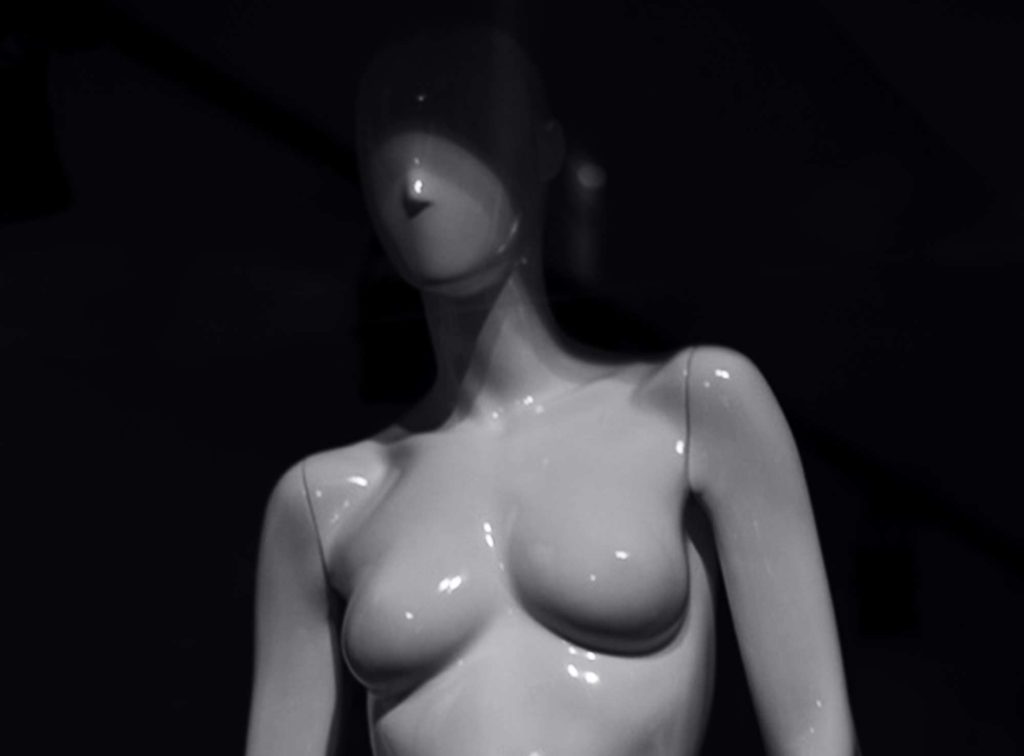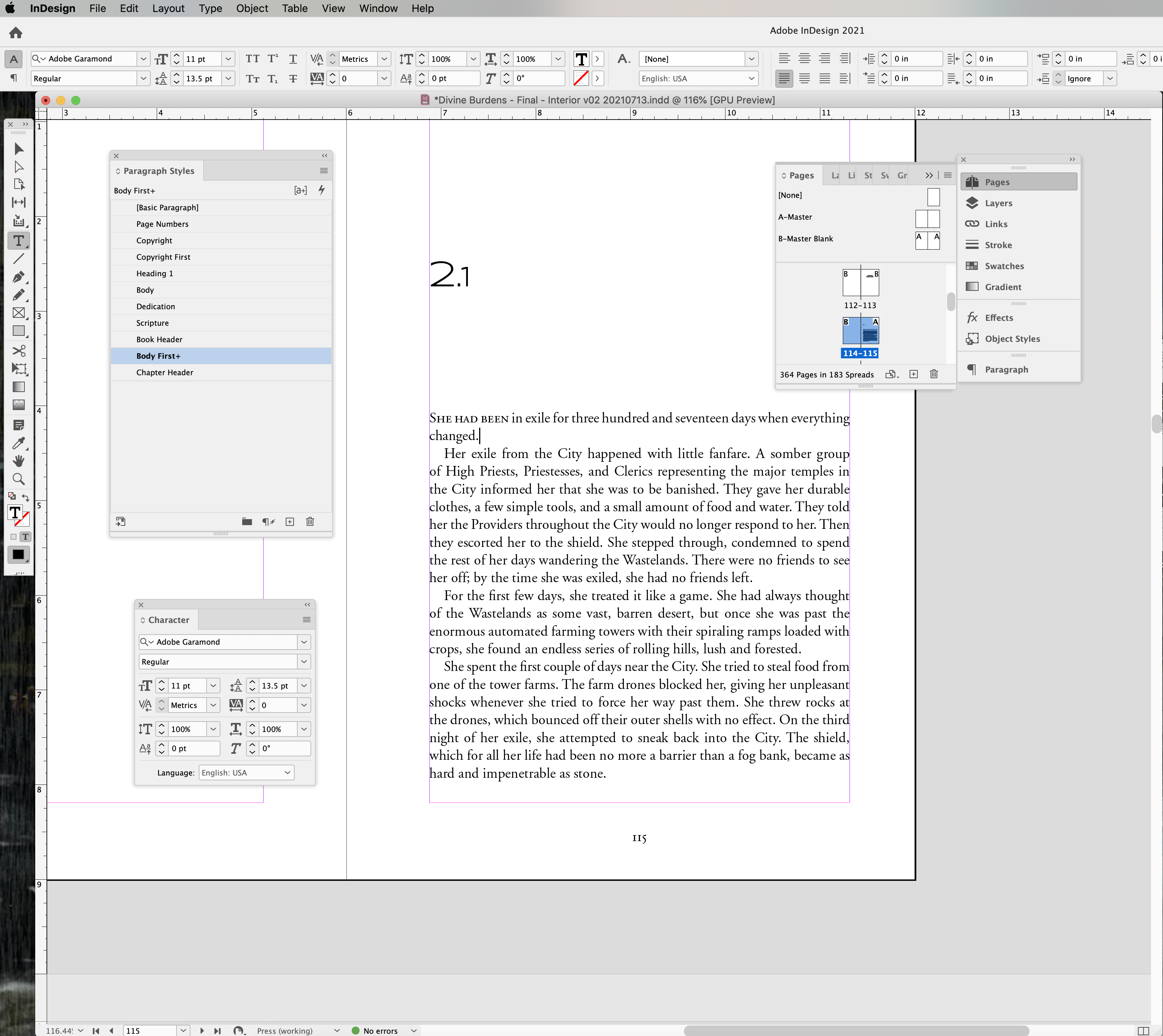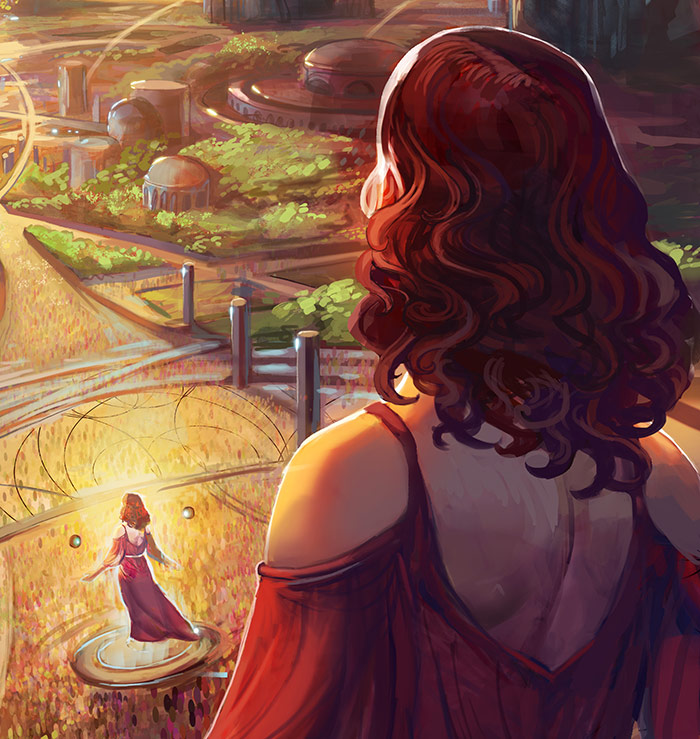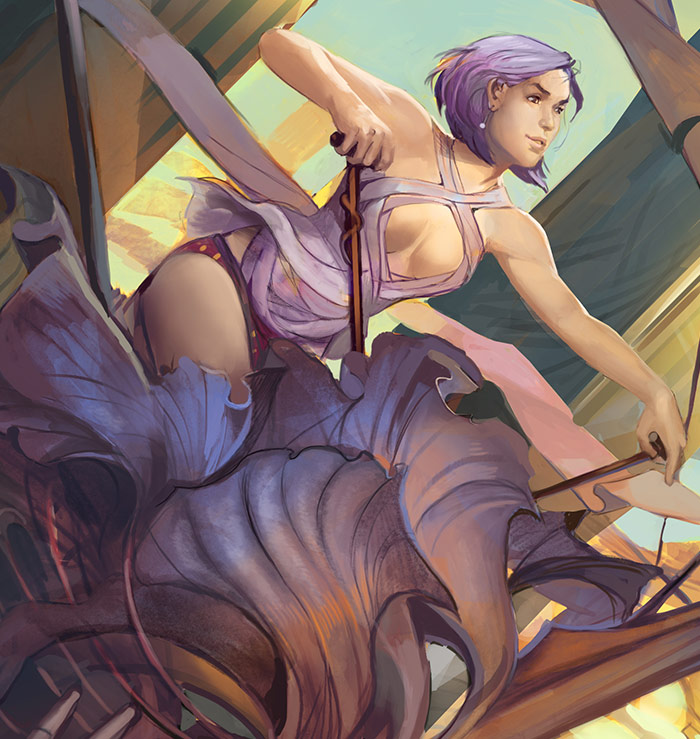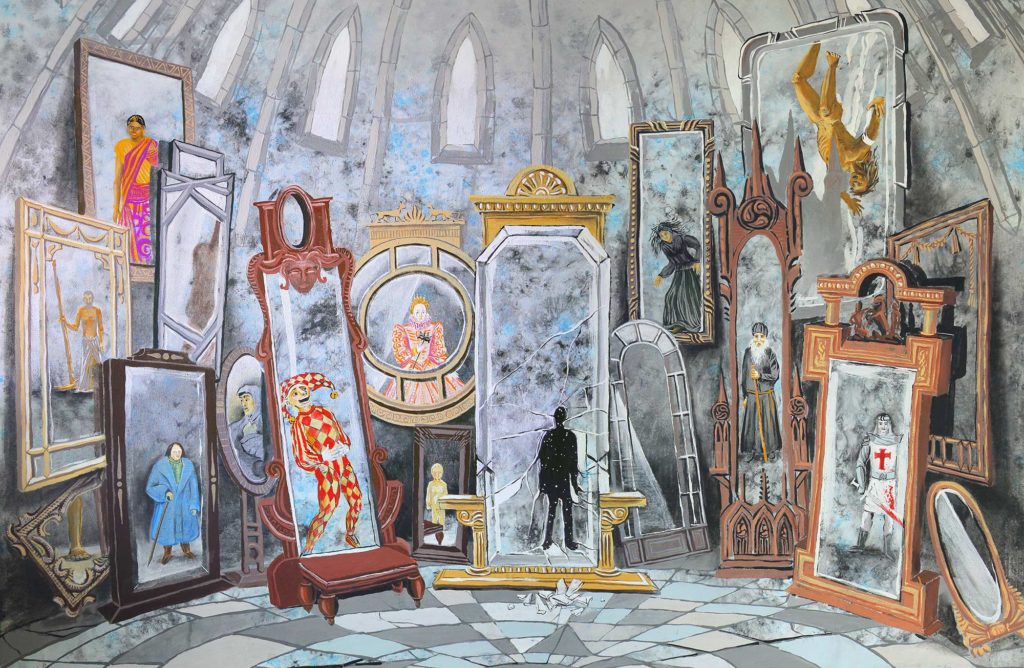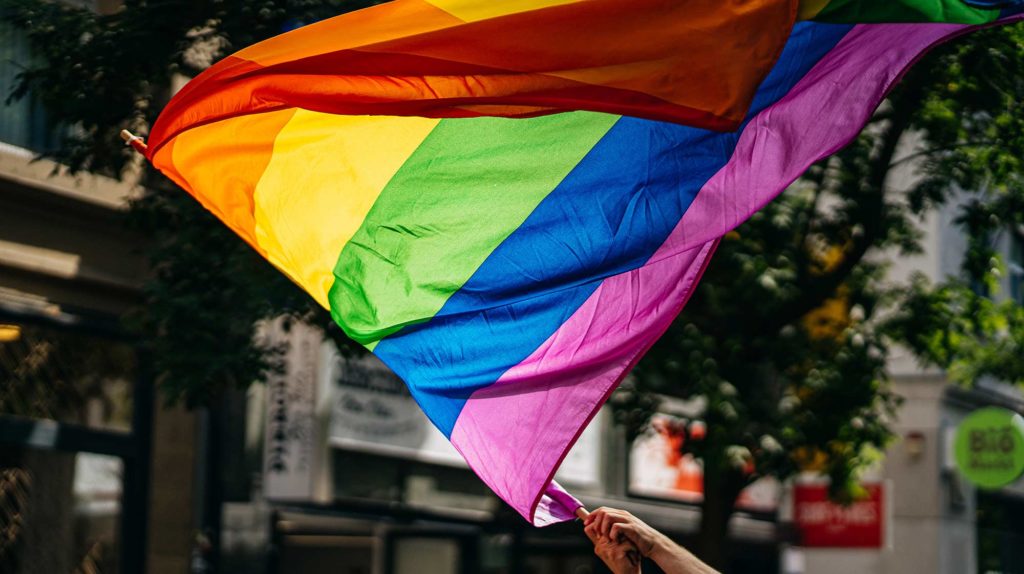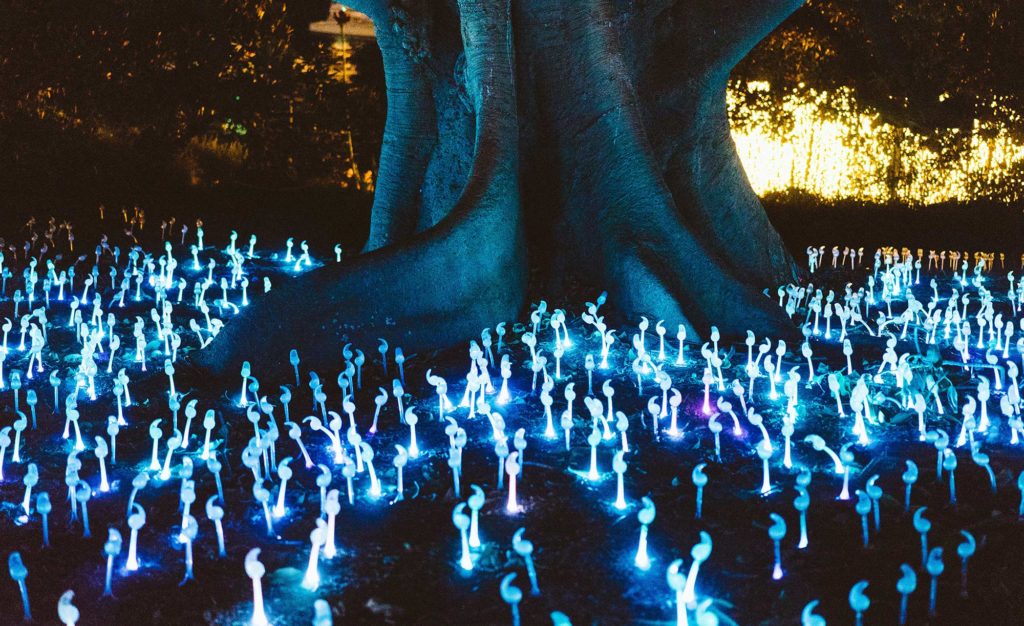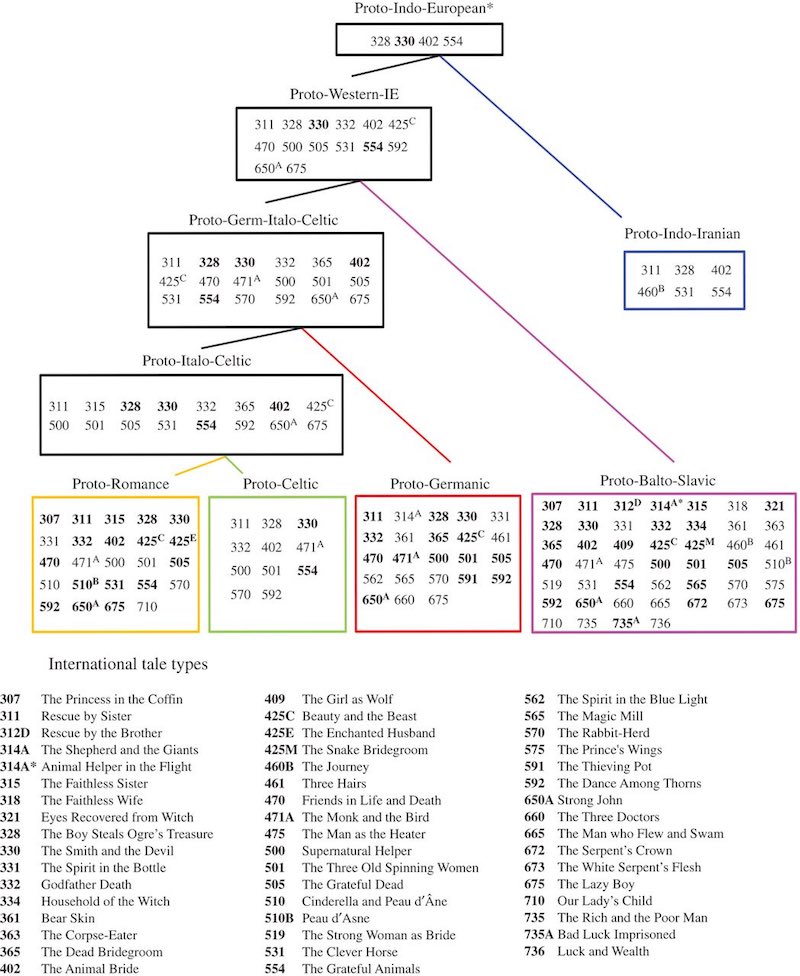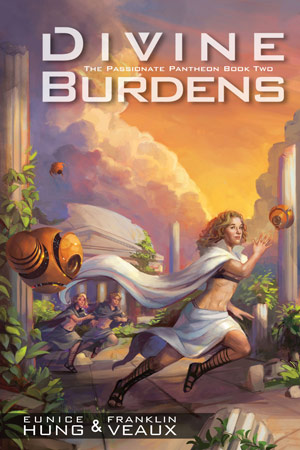Chapter 1 of 3
Chapter 1 | Chapter 2 | Chapter 3
“Donvin! Thank the Lady you’re here! This party is stressing me out.” Kalaian flung her arms wide. “I have no idea what to do, and it’s your fault I’m in this mess!”
“Greetings, Novice Kalaian! Has a nice ring to it, doesn’t it?”
Kalaian paused her frantic tugging of her multicolored, hip-length hair, then flushed. A pleased smile spread across her face. “You know, I think you’re the first person to call me that!”
Donvin examined the small park thoughtfully. Right now, it was little more than a flat square of grass, a blank canvas ready to receive the artist’s touch. At Kalaian’s feet, the black square of a Provider lay inset into the ground, neatly trimmed grass growing around it. A small army of utility drones hovered politely at head height, awaiting instructions. “Having trouble thinking of what to do?”
“No!” Kalaian said. “Just the opposite. I have far too many ideas. The party starts in just a few hours, and I don’t know if I should create a winter paradise of glittering ice or a wonderland of floating lights or a music hall or—”
Donvin laughed. “I see the problem.”
Kalaian knelt in the grass and summoned a small terminal from the Provider. A glowing miniature of the park floated in front of them, ready to be shaped and molded. She threw her arms wide. The hologram grew until it filled the park, a faint shimmering image molded to the ground. “I want a theme that connects the Lady to the Quickener,” she said. “The official purpose of the party is to celebrate my service to the Lady, but I think it’s important to honor my past service to the Quickener, too.”
Donvin slipped an arm around her waist. “You could do a labyrinth.”
Kalaian shook her head. “I was thinking maybe pools for the main area.”
“Statues, then? Inspired by the statues in the Garden? Something that honors both the Quickener and the Lady?”
“Do you have any suggestions?”
“Perhaps one or two. May I?”
Kalaian kissed his cheek. “Thank you for helping me get ready.”
He called up a terminal of his own. At a flick of his fingertips, it came to life. He drew out images of the statues in the Garden, the voluptuous bare-chested figures that welcomed worshippers along the path to commune with the Quickener. Even now, the current Sacrifice to the Quickener slept in the middle of that diamond-shaped labyrinth of hedges, bound by vines whose thorns pierced her flesh as she lay prone on the boulder in the center. Worshippers were probably visiting her at this very moment, communing with the god through her slumbering body, waking her to ecstasy over and over again.
The statues floated silently before him, waiting. He walked around the faintly glowing images, examining them from all sides with an artist’s eye, then dismissed them with a gesture. He called up unformed columns of light in their place and set to work reshaping them with his hands, forming them into stylized impressions of the figures he’d dismissed.
As Donvin worked, Kalaian wandered through the park, molding and shaping the hologram with sweeping gestures. She sang as she worked, her voice filling the late afternoon air with crystalline joy.
Beyond the shield dome, a gentle spring rain started to fall. The shield flared golden with each falling drop, channeling and diverting the rain away from the City. Soon water streamed down the dome in twisting, glowing rivulets. Here and there, openings in the shield permitted the rain into spaces where the City’s citizens luxuriated in the shower.
Donvin fell into his task, lost in that space where all that existed was the formless void and the sinuous lines and forms he pulled from the half-conscious depths of his mind. Kalaian’s song swirled around him, light and exuberant.
He summoned another column of light and another, shaping and molding each with his hands until a line of stylized statues hovered in front of him, all smooth curves and swooping shapes, evocative of the statues in the Garden without being exactly like them. As he finished the last one, Kalaian came up from behind him to place a kiss on his cheek. “Those look amazing!”
“Thank you.” He grinned and kissed her. “How are you doing?”
“Come see!”
She led him through a shimmering, translucent park that floated about waist-high, its contours laid over the real park. In the center, she’d traced out a series of pools, terraced scallops swirling with steaming jewel-toned water, like shimmering molten gems. A long, low table of gray-flecked stone sat just beyond the pools, lined with Providers and surrounded by couches and chairs. A knee-high hedge followed the boundary of the park, bursting with brilliant flowers in vivid shades of orange and purple. A living green archway pierced the hedge, draped with thin flowering vines like a curtain. On the other side of the park, a cluster of couches and chairs formed a loose circle within a space marked out by symbols for shield generators.
“Where would you like the statues?” Donvin said.
“How about along the path from arch to pool?”
Donvin’s fingers danced over the terminal. The glowing holographic statues rearranged themselves. “Like this?”
“Perfect.”
“Ready?”
“Let’s do it.” Kalaian stroked her terminal. The Provider in the ground flipped open. They both dropped their terminals into the black square and stepped back. A huge swarm of tiny, glittering gnats flowed out and set to work reshaping the park. The drones flitted about, darting off to drop chairs and tables in the spots laid out for them in the hologram.
“I have a gift for you,” Donvin said. “Something to celebrate your worship of the Lady.”
Kalaian chuckled. “You mean to celebrate dragging me away from the Quickener, surely.”
“Me?” Donvin assumed a look of pious mock horror. “I simply suggested someone of your talents might find joy in service to the Lady, that’s all.”
“So what gift do you have for me?” she purred, pressing against him.
“In order to properly receive it, you will need to disrobe.”
“Really?” She raised an eyebrow. “I like the sound of this already. Very well then.” She reached behind her neck to touch the fastener. Her lightweight, translucent dress floated to the ground, its scintillating colors gleaming in the sun. A small utility drone snatched it up and carried it away. “I’m curious about what you have for me that requires me to be unclothed.”
Donvin produced a small, heavy sphere of dark purple glass from his pocket. He held it out in the palm of his hand. Dim light swirled in its depths. Kalaian reached out to touch it. The moment her fingers brushed its surface, the sphere blazed with brilliance. Colors flowed up her arm and down her body, changing and swirling as they moved. Shapes coalesced from the flowing colors, vines with long stems and thick green leaves wrapping around her arm, down her side, across her leg.
Buds unfurled along the vines into small flowers in delicate pastel shades. They spread wide, flinging out petals that transformed into brilliant, colorful butterflies, twisting loose from the vines to flutter across her chest and over the curve of her breasts. When they reached her shoulder, they floated free, hanging glittering in the air for a moment before fading.
Kalaian held out her arms and pirouetted. A stream of butterflies whirled in a spiral above her. She clapped her hands with delight. “I want to see!”
A round drone of brilliant blue metal inlaid with bands of dark wood drifted over to hover in front of her. The air before it flickered, then an image appeared before her, a mirror twin of herself. Kalaian laughed and turned this way and that. “It’s gorgeous!” She danced in a small circle, twirling with sinuous grace. The butterflies trailed behind her. “Thank you! It’s lovely!”
The mirror-Kalaian vanished. The drone flitted off. Donvin frowned. He stroked her side with his fingertips, tweaking the shape of one of the vines as it wound around her body. He ran his fingers up over her breast, extending a set of leaves behind them.
Kalaian’s breath caught. She took his hand in hers and folded it over her breast. “Oh. You can’t just tease me like that and not follow through.”
“I can’t?” Donvin grinned. “Why not?”
“Because that would be unfair.” Kalaian ran her fingers over his face. “And I know you wouldn’t want to be unfair.”
“I wouldn’t. Especially on your special day.” He leaned forward. Their lips met.
Around them, the drones darted about, carrying and shifting things. The swarm reshaped the park, its contours flowing like liquid. Donvin and Kalaian ignored the chaos, lost in each other. She slid his hand down her body with a sigh.
Donvin wrapped his arms around her, hands warm against her skin. A sparkling cloud of butterflies fluttered around them. Her tongue flickered against his lips. Her hands slid along his trousers. “Ooh, what’s this? I think you have something else for me, too!”
“If you like,” Donvin said. “I’d hate to be presumptuous.”
“Oh, be presumptuous,” she said. “Perhaps I like when you presume.” She unfastened the front of his pants and grinned mischievously. “Well hello there, you do seem to be in quite the audacious mood! How delicious.”
Donvin stepped back and lifted his shirt. She caught his hands. “It’s more fun if you don’t.” She pressed herself against him, warm skin on smooth fabric. Her fingers slipped into his waistband, exploring, stroking his growing erection. “Perhaps I want to be a little presumptuous myself.”
“I do appreciate a good display of presumption.”
Her eyes sparkled. “Your offer is acceptable.” She pressed him down to the grass in a cloud of small bright butterflies. The glittering throng of mechanical gnats flowed out of their way. Kalaian straddled him, adjusting his dark-colored pants just enough to free his thickening cock. She let out a small gasp as she settled atop him.
“You seem in quite a mood,” Donvin observed, breathless.
“Is that what this is? A mood?” Kalaian purred as she leaned over. She pressed a series of tiny kisses on his lips, feather light, as she shifted atop him. Donvin slid his hands up her sides. Butterflies tumbled around them. A shiver ran through her. She straightened, eyes closed, hands on Donvin’s chest. “Oh! Oh, I think you are getting downright impertinent.”
“Is there anything I can do to…lend a hand?”
“Yes! Yes there is.” Another shudder. “Just stay still, you impertinent man, you. Just…” She threw back her head and cried out.
A glittering green utility drone with iridescent wings drifted down with a large, soft pillow clasped in its gleaming metallic arms. It slipped the pillow behind Donvin’s head, tucking it comfortably under his neck. Above them, brilliant streamers of gold wrapped around the City, flowing along the shield dome. Kalaian moved faster, hips working against Donvin. Her fingers clutched his shirt. “You lovely, wonderfully audacious person! I’m…I’m…” Her body convulsed in ecstasy.
Donvin arched his back, driving deep into her. The drone chimed. “Oh!” Kalaian panted. “It’s time.” She hauled herself to her feet, lifting himself off him.
Donvin gasped, shuddering on the edge of orgasm. “Hey now! I—you—you—you dreadfully insolent—”
“Yes?”
“I hope you’re intending to resume this conversation later!”
“Oh, certainly. I’m looking forward to it.” She extended her hand and helped him stagger to his feet. Her fingertips brushed the head of his cock. “Tuck this away. We wouldn’t want any guests thinking you are being impudent.” As Donvin sputtered, she tugged his trousers closed. “Once you’re in a fit state, be a dear and come help me greet people?”
“I’m not likely to be in a fit state until we finish our conversation,” Donvin grumbled. He smoothed down the front of his shirt.
Kalaian glanced back over her shoulder with a light joyful peal of laughter. “As long as you can pretend for the length of a party, that’s good enough!”
